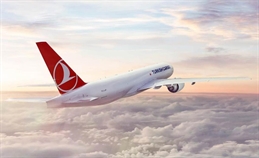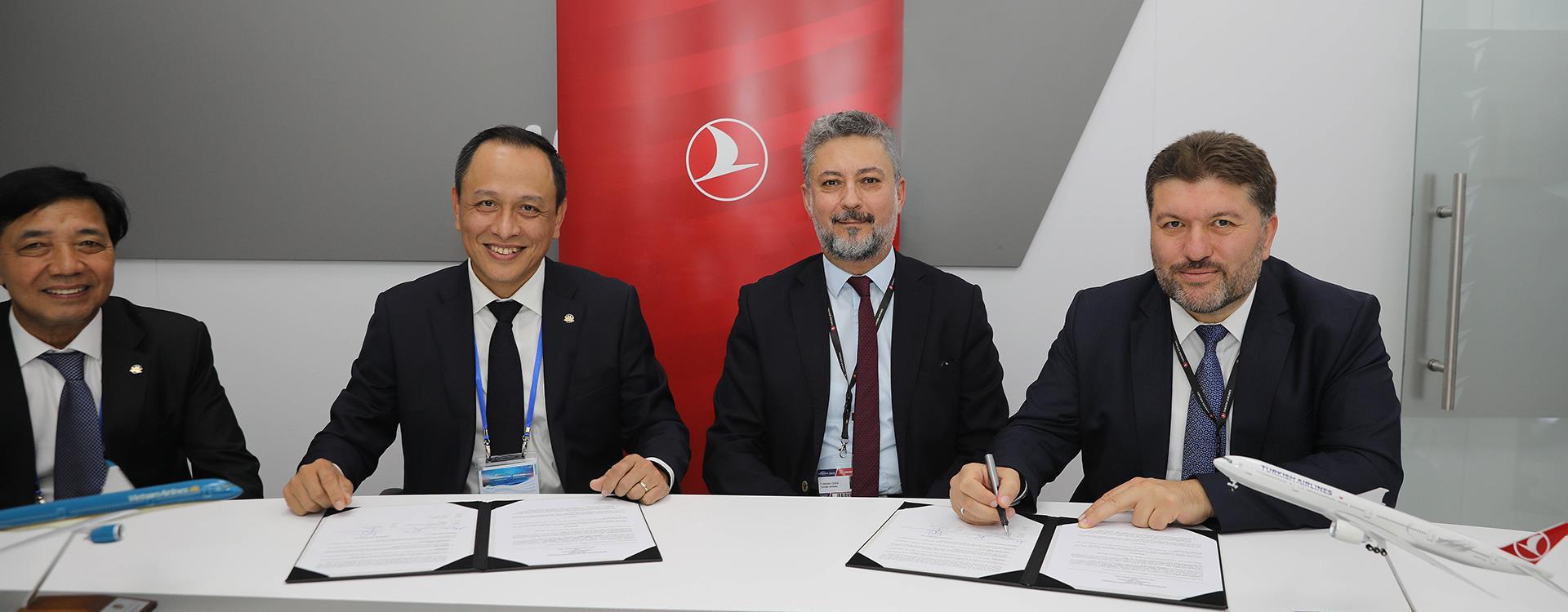
International cargo carriers are closely monitoring, with a sense of unease, the moves being made by Turkish Cargo, the cargo division of Turkish Airlines, in the global markets after recently emerging as the largest European cargo carrier.
Recent statistical data released by the International Air Transport Association (IATA) reflects that Turkish Cargo had achieved a total volume of 9.3 million freight tonne-kilometres (FTR) in 2021. The carrier’s cargo volume surged by more than 32%, catapulting it to the top ranking among the European cargo carriers and to the fourth spot worldwide.
German and European experts point out that the Turkish carrier’s dramatic ascent in cargo transport was backed by its robust growth in recent years.
Indeed, Turkish Cargo has recorded impressive growth rates year after year, overtaking most of its competitors. Even during the critical year of 2019, when most airlines faced sharp declines in traffic, Turkish Cargo recorded more than 19% growth. Indeed, during the pandemic-related slowdown in cargo traffic, the carrier sustained an almost negligible 0.5% decline in traffic.
Explaining his carrier’s success, Turkish Airlines’ chair Ahmet Bolat has been saying that “we continue to add value to the air cargo industry with our contributions to the supply chain and maintain our critical role when it comes to increasing the global trade’s competition power.”

After improving and upgrading the fleet, infrastructure, and processes aimed at enhancing its efficacy, Turkish Cargo made it a goal to clinch one of the top five coveted positions – moving from 22nd to 4th in global rankings while increasing its market share from 2.6% to 5.2% during the last five years. The carrier increased its fleet of 13 cargo planes in 2017 to 20 planes in 2022.
These factors also enabled it to almost double the number of destinations operated by freighters, reaching 100 in 2022.
The Covid-19 outbreak also helped the cargo carrier, which increased its market share by 8% on medical cargo shipments. There was a surge in demand for products and materials needed to combat the pandemic.
Turkish Cargo, according to German analysts, stands to gain from its latest cargo link between Munich and Istanbul, from where the carrier transports the cargo to several Asian destinations. The carrier deploys Airbus A330 freighters to and from Munich.
Bavaria’s business community and the Munich airport management have welcomed the carrier’s operations at Munich airport, pointing out that the first flights to Istanbul each transported 50 tonnes of freight. Bavaria-based industry in close proximity to Munich includes global players and market leaders in the automotive, electronic, medical technology, biotechnology and aerospace sectors.
Jost Lammers, Munich airport’s chief executive, said that he sees “enormous potential” for demand.
“Against the backdrop of the continuing crisis in aviation, the inauguration of this Munich-Istanbul route is an important show of confidence in Munich as an air cargo centre,” Lammers said.
At the recent Frankfurt Air Cargo Days, a cargo event organized at Frankfurt airport, Turhan Ozen, head of cargo at Turkish Airlines, made the prediction that “only those cargo airlines will be successful that react fast to changing circumstances and adapt to new situations with utmost flexibility.”
“That may sound like a Cassandra cry, but it reflects the resilience shown by the Turkish carrier amid the pandemic in 2020 and 2021. Turkish Cargo quickly adapted and converted its wide-bodied passenger aircraft to freighters, pulling out the seats and using the space for transporting urgently needed PPE [personal protection equipment] articles. This helped the carrier achieve record growth,” noted Dieter Fischer, who operates a forwarding service outside of Frankfurt.
The carrier’s upgrading of its infrastructure at the new Istanbul airport helped the smooth flow of cargo traffic from Munich and other points of origin. The inauguration of Turkish Airlines’ new mega hub, called SMARTIST, at the Istanbul airport in February 2022 provided strong support to facilitate and absorb the increased cargo traffic.
When all its phases of upgrading and construction are completed, SMARTIST will have, among other things, enhanced and improved reality and automatic storage systems implemented and maintained by German company Lodige Industries, which provides specialized logistics solutions.
The cargo facility is also equipped with robotic process automation and unmanned ground vehicles, which will speed up cargo throughput or temporary storage of goods.
The carrier has, apparently, set its eyes on world markets, and in an attempt to achieve this goal, it has been entering into strategic cooperation in major markets. It signed an agreement with China’s YTO Cargo Airlines. Turkish Cargo is trying to strengthen its cargo connections and build additional capacity between China, Central Asia and Turkey.
As part of the agreement, four flights are being operated on a weekly basis between Xi’an and Tashkent by YTO Cargo Airlines. The import and export cargo capacity on such flights is being utilized entirely by Turkish Cargo and being offered to its customers.
Cargo shipments from China are being connected to Turkish Airlines’ Tashkent-Istanbul flights on the same day, following their transfer from Xi’an to Tashkent. Upon arrival at Turkish Cargo’s mega hub at Istanbul Airport, the cargo shipments are transported to their consignees through the extensive international network Turkish Cargo has built up.
Turkish Airlines has also signed a memorandum of understanding on cooperation with Vietnam Airlines. The MoU was signed at the Farnborough International Airshow in the United Kingdom.
The Turkish carrier’s calculation is that as the aviation industry is recovering in the post-pandemic period, cooperation between the two carriers will not only sharpen their
competitiveness and create new business opportunities for them but also promote economic, cultural and social exchanges between Turkey, Vietnam and the Middle East and Europe.
The implementation of a code-sharing partnership starting in 2023 between the two airlines is expected to give a strong boost to their cargo traffic. This could also open up more avenues of cooperation between the two carriers.
While, clearly, Turkish Cargo is further strengthening its position in Asia with its existing operations in the Middle East and Europe, Vietnam Airlines is making efforts “to strengthen global cooperation expand the route network to recover the economy after the pandemic and seize new development opportunities”, as Hong Ha Le, president/CEO of Vietnam Airlines, was quoted as saying.
By Manik Mehta
International Correspondent | Frankfurt



